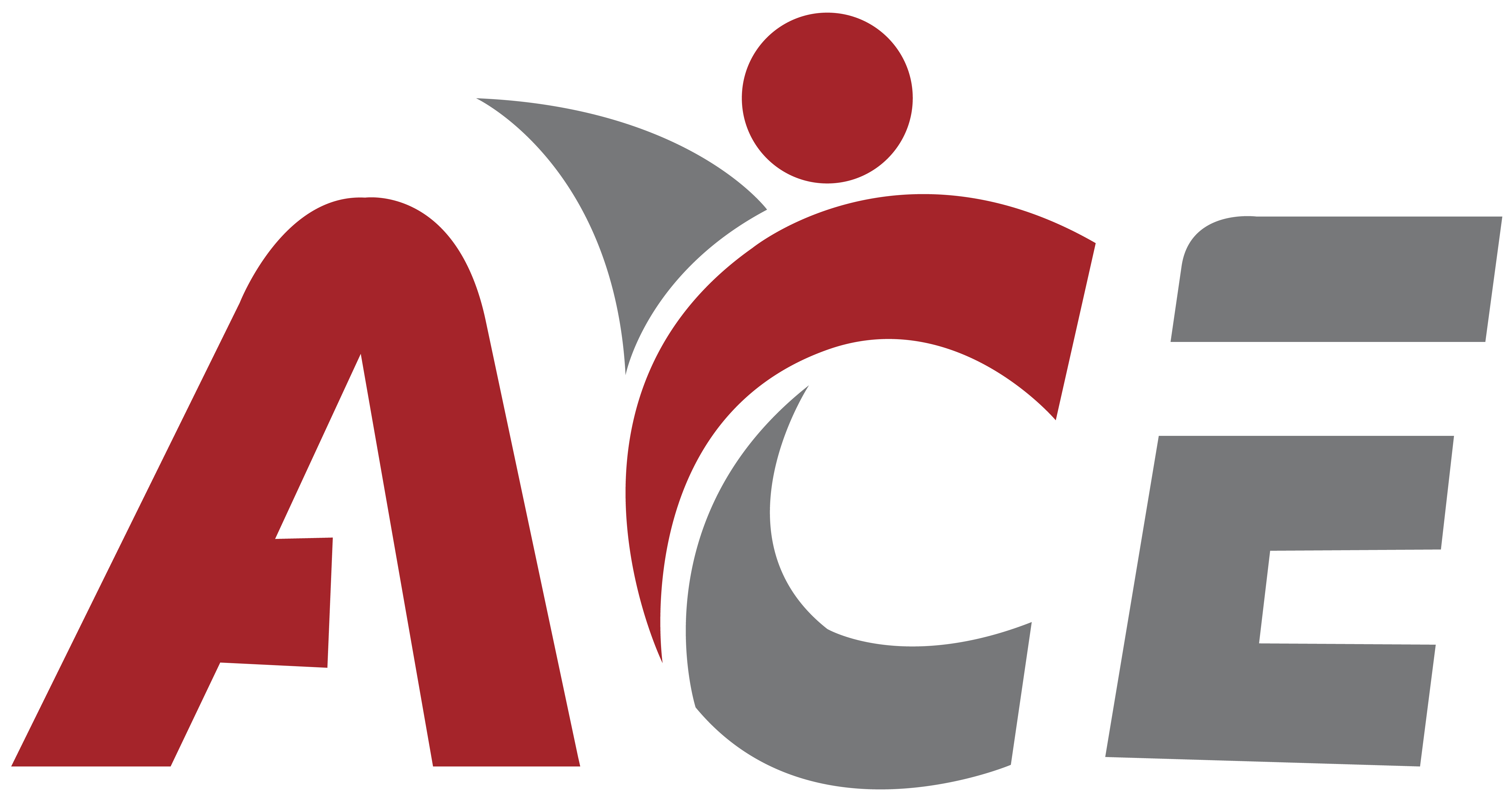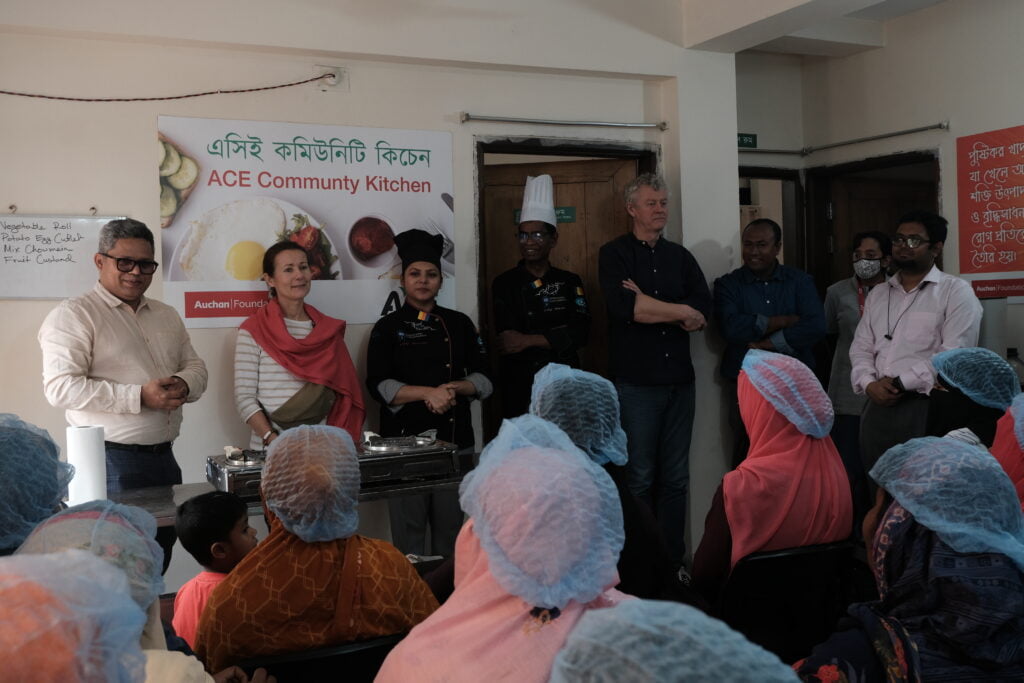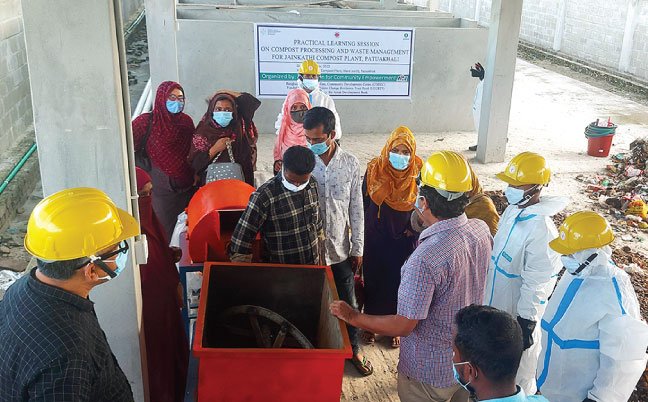Health and Nutrition

ACE acknowledges interconnected health, food & nutrition, and water, sanitation & hygiene are crucial for a thriving community. That’s why the organization is developing a replicable integrated model for nutrition activities to improve health, nutrition and well-being of RMG workers through a participatory model of cooking healthy food.
Health: We are keeping health at the forefront of all our projects. We focus on promoting preventive care, increasing access to essential healthcare services, and addressing prevalent health issues within the community.
Food & Nutrition: ACE believes all efforts to keep our communities safe will only succeed if they have access to good food and nutrition. That’s why our initiative aims to improve dietary practices and ensure access to safe and nutritious food. Our programs are designed to empower communities to make informed nutritional choices.
Water, Sanitation & Hygiene: Promoting sanitation and hygiene is essential to protect all communities equally from disease by preventing the spread of pathogens. ACE has undertaken to develop programs where clean water; sanitation facilities and hygiene education will be provided.
He who has health, has hope ; and he who has hope, has everything.
Thomas Carlyle
Climate Change & Environment

ACE is an organization working to revolutionize how we think about the climate and environment. The organization is promoting significant changes in attitudes and behaviors. As the environment and climate change are deeply interconnected, ACE is tackling these challenges from multiple angles:
Climate Change Actions: We address the root causes of climate change by promoting clean energy solutions, advocating for sustainable practices and fostering climate awareness.
Environmental Sustainability: We encourage the responsible use of our planet’s resources. In this context our initiatives include promoting conservation efforts, protecting ecosystems, and encouraging responsible consumption habits.
Waste Management: We believe in a circular economy where waste is minimized, and resources are reused and recycled. We advocate for responsible waste management practices and promote innovation in this crucial area.
A nation that destroys its soils destroys itself. Forests are the lungs of our land, purifying the air and giving fresh strength to our people.
Franklin D. Roosevelt
Inclusive Economic Development

ACE believes that inclusive economic growth is vital to all aspects of the development of individuals. To foster inclusive economic development to empower communities, ACE is focusing on three key thematic areas:
Sustainable Agriculture: ACE is designing its program to support local communities in developing and implementing sustainable agricultural practices that increase productivity, income, and food security. These initiatives include promoting climate-smart techniques, access to resources like seeds and fertilizers, and market linkages for farmers.
Livelihood Diversification: To ensure everyone’s participation in the development of diverse livelihood opportunities beyond traditional farming should be created. ACE plans to achieve this by providing training and resources for income-generating activities like handicrafts and small businesses.
Skill Development: We are motivated to invest in building the skills and knowledge needed for individuals to thrive in the changing economy. ACE is looking forward to designing a program that will include training programs in areas like financial literacy, digital literacy, and vocational skills relevant to local job markets.
Empowering the individual means empowering the nation. And empowerment is best served through rapid economic growth with rapid social change.
Atal Bihari Vajpayee
Policy & Advocacy

ACE recognizes the role of policy and advocacy in creating positive social change. In this context, the organization is working on:
Community Empowerment: We are working on initiatives that will support and enable people to express their concerns, access information and services, defend their rights, and explore further choices and options.
Diversity & Social Integration: ACE champions our community’s diversity while striving to tear down barriers and build a society in which everyone feels welcome and cherished. Social integration is crucial to ensure each individual’s participation in development.
Good Governance: To build a just society it is important to promote transparency, accountability, and participation in decision-making processes. Focusing on that we advocate for policies that reflect the needs of the community and ensure all voices are heard.
Never doubt that a small group of thoughtful, committed citizens can change the world; indeed, it's the only thing that ever has.
Margaret Mead
Education

ACE prioritizes the transformative power of education and focuses on the development of social and emotional well-being, inclusive learning environments, and the use of technology to achieve educational goals.
Inclusive Education: In the delicate tapestry of societal development, education is a pillar of empowerment and progress. We strive to create programs that meet the different requirements of all learners, ensuring no child is left behind. This includes initiatives for students with disabilities, special needs, and those from marginalized backgrounds.
Social and Emotional Learning: Social and emotional learning (SEL) promotes the development of lifelong skills and behaviors that enable people to identify and manage emotions, regulate behavior, and make responsible decisions. This emotional Intelligence helps to set and achieve individual and collective goals. That’s why we advocate integrating social and emotional learning strategies into our curriculum.
Technology for Development: Educational technology is a process of integrating technology into education in a positive manner that promotes a more diverse learning environment and a way for students to learn how to use technology. We are focusing on providing digital resources, computer literacy training, and innovative teaching methods to promote accessibility and engagement.
Education makes a people easy to lead but difficult to drive: easy to govern, but impossible to enslave.
Peter Brougham


